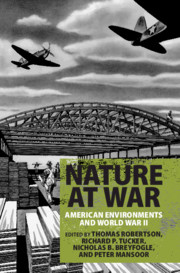Book contents
- Nature at War
- Nature at War
- Copyright page
- Contents
- Figures
- Tables and Charts
- Maps
- Contributors
- Preface
- Acknowledgments
- Introduction
- Part I New Weapons, New Spaces
- Part II Military Materials I (metals and energy)
- 3 “Tanks Are Born Underground”
- 4 Fueling the “American Century”
- Part III Military Materials II (foods and plants)
- Part IV New Landscapes
- Part V New Frontiers
- Part VI Conservation
- Index
3 - “Tanks Are Born Underground”
Mining and World War II
from Part II - Military Materials I (metals and energy)
Published online by Cambridge University Press: 25 March 2020
- Nature at War
- Nature at War
- Copyright page
- Contents
- Figures
- Tables and Charts
- Maps
- Contributors
- Preface
- Acknowledgments
- Introduction
- Part I New Weapons, New Spaces
- Part II Military Materials I (metals and energy)
- 3 “Tanks Are Born Underground”
- 4 Fueling the “American Century”
- Part III Military Materials II (foods and plants)
- Part IV New Landscapes
- Part V New Frontiers
- Part VI Conservation
- Index
Summary
We can see the central reality of metals at all scales of the war. Young American men jumping into the frigid ocean off Omaha Beach on the morning of June 6, 1944, to give one of the more well-known battlefield examples, faced waves of machine-gun fire and pulses of artillery. They were keenly aware of the deadly, hurling metal all around them. “When I landed on Omaha Beach and hit that sand, I got behind any obstacle I could,” remembered Felix Branham. “Guys would try to get behind stones as big as coconuts, anything you could get behind, maybe even as small as a baseball. You’d try to keep the bullets away. They were firing at us with everything. I dare say we were on the beach an hour and a half with bullets flying. Bullets nicked off of my helmet. One went through my ammo belt.”1 Almost 1,500 Americans were killed at Omaha Beach that morning, and twice as many were wounded, bodies pierced by high speed metal and explosive minerals. At Omaha, the most storied of the five beachheads, almost everything went wrong that morning, leaving most of the first two waves of soldiers sitting ducks for the well-armed German defenses. “Men burdened with equipment and explosives were excellent targets for enemy fire as they unloaded in water often several feet deep,” reported the army on the tragedy six months later. The surviving American soldiers experienced the terror described by Branham, the primal fear of machine guns pinning them down in open territory – metal spraying like rain across vast stretches of space. Once these soldiers secured the beach, they began to reverse the flow of metals, in the form of the tanks, machines, and armaments unloaded onto the beach ready for service.2
- Type
- Chapter
- Information
- Nature at WarAmerican Environments and World War II, pp. 87 - 115Publisher: Cambridge University PressPrint publication year: 2020



